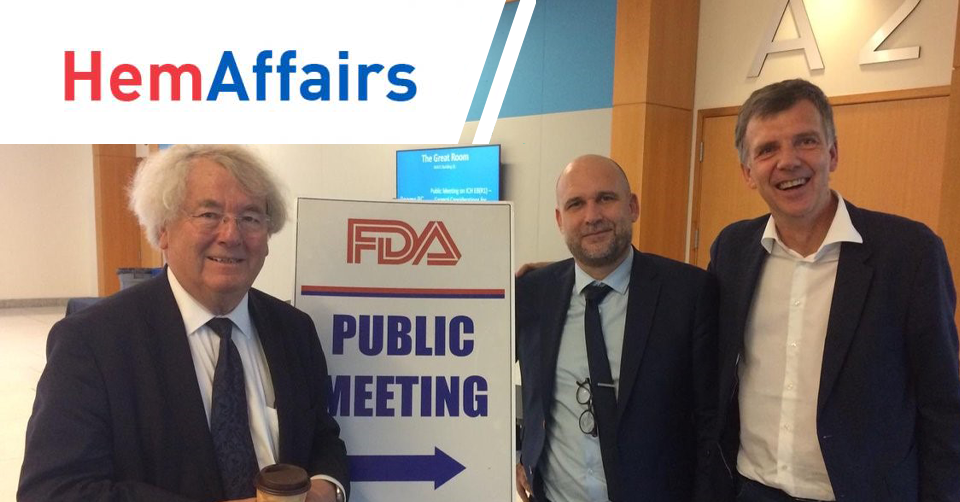This information originally appeared on the previous EHA website. Links to other pages may be inactive.

The EHA delegation to the ICH meeting: from left to right, Professors Christian Gisselbrecht, Steven Le Gouill and Martin Dreyling.
Clinical trials and drug development have become more complex over the years. One complicating factor is the increased administrative burden, as was pointed out in the previous edition of HemAffairs. Doctors and clinical researchers are more and more bound to rules they deem neither necessary nor effective. At first sight, the requirements for clinical trials seem clear and thorough. Nonetheless, the interpretation and implementation of these rules leave room for improvement.
Which rules are we talking about?
Standards for clinical trials must be adapted to current practices and environment. While the EU is turning to the implementation of the new Clinical Trials Regulation (CTR)[1], the International Council for Harmonisation of Technical Requirements for Pharmaceuticals for Human Use (ICH) has been working on a revision of its 1997 ‘Guidelines for Clinical Trials’.
ICH is an organization that brings together the regulatory authorities and pharmaceutical industry to discuss scientific and technical aspects of drug registration. The 1997 Guidelines set out general principles for harmonized standards to protect the rights and safety of patients. Anno 2019 these guidelines have become inadequate.[2]
What’s the problem?
A key issue with clinical trials is not regulation in itself, but overinterpretation and implementation. Particularly when it comes to the reporting of Suspected Unexpected Serious Adverse Reactions (SUSARs). According to experts, SUSARs should be reviewed by a medical doctor, as they are most competent to report them. However, in practice SUSARs are too often checked by unqualified individuals who work at Contract Research Organizations (CROs).
CROs are third parties that take on paperwork for pharmaceuticals. This ‘threesome’ has led to an impasse; 95% of reported SUSARs are not SUSARs at all. In the end, the increased complexity of the process negatively affects patient safety. Overinterpretation also has a negative impact on innovation. Therefore, we must strive for more sensible interpretation of the rules.
EHA’s contribution to the Guidelines
On October 31, ICH organized a stakeholder event to solicit input for the new guidelines. The EHA delegation to the event – composed of Prof. Martin Dreyling, Prof. Steven Le Gouill and Prof. Christian Gisselbrecht – could only regret that stakeholders’ consultation comes rather late into the ICH revision process.
EHA representatives thoroughly explained how ICH overinterpretation perverts the initial aim of optimizing patient safety, as truly important signals are lost, diluted in an unmanageable number of trivial queries and unfiltered notifications of SUSARs. The ensuing bureaucracy leads to an increase in the cost of clinical trials and thus the affordability and accessibility of new drugs, while constituting a death sentence for independent research. Clinicians and patients should be involved in the whole drafting process of the guidelines.
In addition to its participation in the stakeholder conference, EHA provided a collective response to the online consultation about the ICH guideline E8 (R1) on General Considerations for Clinical Studies. The revision of the guideline is expected to be completed by June 2020.
For a short impression of the ICH E8 (R1) consultation meeting, click here.
[1] For more information on CTR go to: Current status of the Clinical Trials Regulation, July 2019
[2] ICH Reflection on “GCP Renovation”: Modernization of ICH E8 and Subsequent Renovation of ICH E6, 2017